The Prime Minister answered Russian media representatives’ questions following a Eurasian Intergovernmental Council meeting.
Excerpts from the transcript:
Question: Let me begin with a question about the agenda. The meeting participants discussed the mechanisms for distributing import duties between the countries of the Union beginning 1 January 2020. Which one did the Council decide on? What did you agree on regarding the EEC decision, about which Russia complained, and which requires Russia not to close its market to Belarusian dairy products if they have proper veterinary papers?
Dmitry Medvedev: First, the discussion was truly constructive. We met many times, and it was one of the most constructive discussions. I want to thank my colleagues - the prime ministers and the heads of government of the EAEU member states - for this. This is my first point.
Second, there are difficult and less difficult subjects. The questions you posed fall under the category of difficult subjects. Regarding distribution of customs duties, the solution is as follows. There’s no final solution of how to go about it, because we hear the arguments provided by our Belarusian partners. However, if we fail to reach an agreement by a certain deadline, we will fall back to the previous model. The Kyrgyz Republic is about to freeze its participation in this process. So, we agreed to work hard for the next two to three weeks. A solution must be found through consultations between the governments. My colleagues, deputy prime ministers, received these instructions.
Regarding the decision on the veto related to our appeal to the Eurasian Commission on milk, frankly, we agreed that we will strive to avoid sector-specific sanctions, blockages and decisions associated with the industry as a whole, including, let’s say, the dairy industry. However, we agreed that we would introduce a temporary restriction on all milk-related issues and companies that are now unable to sell their products on the Russian market. That is, nothing will change, and we will review every enterprise individually. That is, we will abandon sector-specific decisions, but they will be replaced by decisions at the company level. Nothing will change in this sense, but we will thoroughly analyse each company like this. I issued these instructions to Minister Patrushev and Head of Rosselkhoznadzor Sergei Dankvert.
Question: Mr Medvedev, Belarus wants to invoice us for damages caused by contaminated oil. What do you think about this? Could this impact in any way Moscow’s position in its discussions with Minsk regarding compensations for tax manoeuvres?
Dmitry Medvedev: Mr Roumas and I just touched on this matter. With regard to contaminated oil, of course, this issue needs to be sorted out. This is a bad incident which needs to be thoroughly investigated. The investigation is being conducted by law enforcement agencies and technical authorities. This investigation should lead to decisions to hold the guilty individuals and companies accountable under administrative or criminal law. We need to make sure that we follow through on all these undertakings. This is what I promised to our partners from Belarus.
At the same time, this contaminated oil has already been replaced by standard crude, and this oil is about to reach Belarus, the country’s pipelines and refineries. I hope that this incident will be closed, although I have to admit once again that it was a bad sign. We must do everything it takes to prevent this from happening again.
As for bundling this incident with various other decisions discussed by Russia and Belarus, this is absolutely out of the question.
Question: Mr Medvedev, I have a question on Ukraine. You received the leaders of Ukraine’s Opposition Platform – For Life, Mr Boiko and Mr Medvedchuk, ahead of the presidential election in Ukraine.
Dmitry Medvedev: I did.
Question: At the meeting, Gazprom CEO, Mr Miller, put forward a number of proposals on gas, including on the gas consortium and the price of gas. To what extent do these proposals apply to the current Ukrainian leadership, after a change of president?
Dmitry Medvedev: Our position remains unchanged. It is not a question of who won or lost. After all, it is up to the people of Ukraine to decide. The question is how we will work together in the future, if at all. Therefore, all the proposals that were made during the conversation with our colleagues from Ukraine naturally apply to the new government, if they want it, of course.










